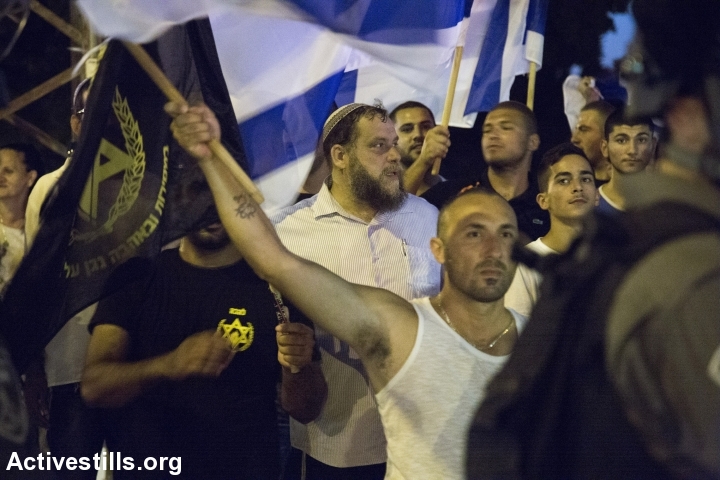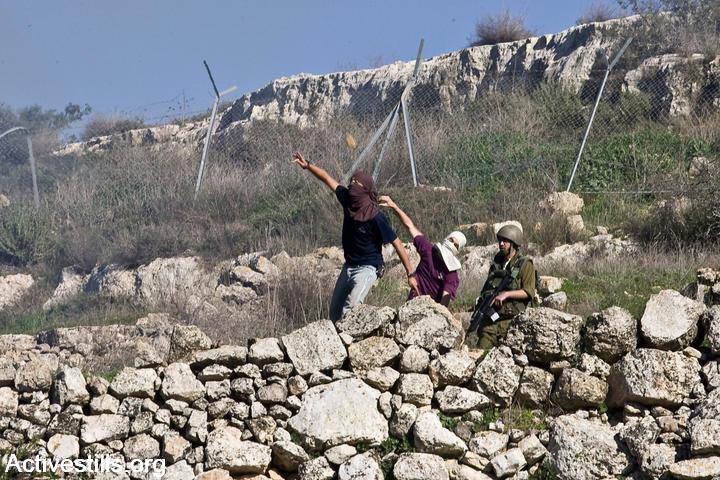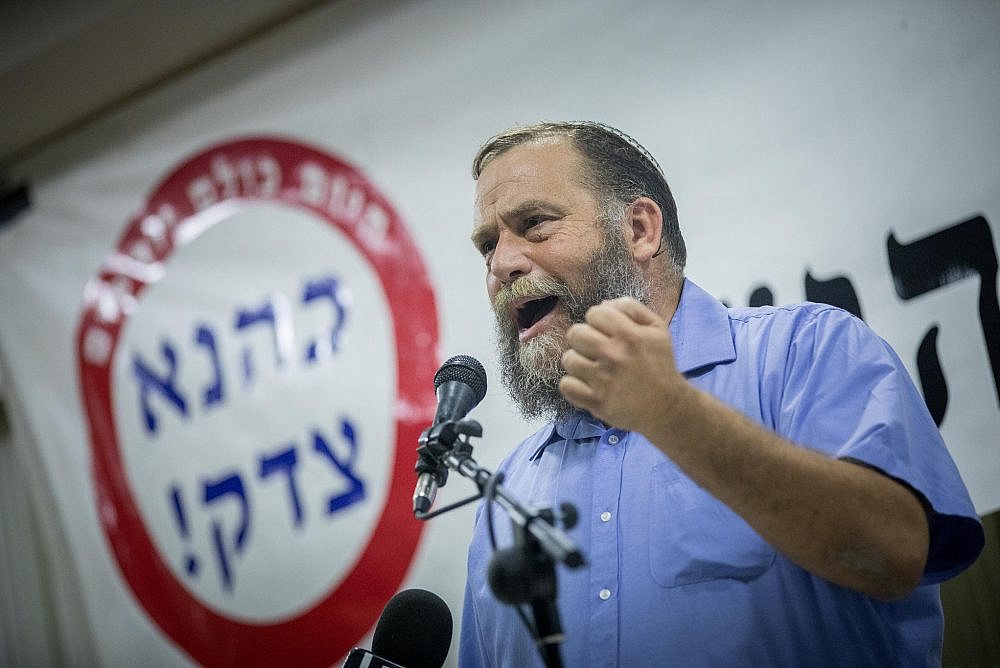A Jerusalem court on Tuesday charged Benzi Gopstein, head of the racist anti-assimilation group Lehava and barred Knesset candidate for Otzma Yehudit, with incitement to violence, racism and terror, and for expressing support for the 1994 massacre at Hebron’s Cave of the Patriarchs by Baruch Goldstein. His indictment culminates an eight-year campaign by the Israel Reform Action Center (IRAC), Reform Judaism’s legal arm in Israel, to bring Gopstein and Lehava to account.
Gopstein’s indictment cited, among other things, video clips in which he justified the use of violence against Palestinians in relationships with Jewish women; called the “enemies among us” (i.e. Palestinians) a “cancer” and proposed that the solution was to remove the Dome of the Rock and al-Aqsa Mosque; and claimed that any Palestinian he saw at a Jewish wedding would end up “in the nearest hospital.”
Gopstein, a student of Jewish Defense League founder and racist demagogue Meir Kahane and former activist in the latter’s Israeli political movement, Kach, has a long and storied career of violent racism. He habitually brushed with the law as a youth, most notably in his arrest (and subsequent release for lack of evidence) in November 1990 on suspicion of involvement in the murder of two Palestinians, apparently in retaliation for Kahane’s assassination in New York earlier that month.
Of all Kahane’s disciples who still occupy a place in the limelight, Gopstein has perhaps worked the most assiduously to continue his mentor’s driving obsession: preventing relationships between Jews and Palestinians, above all Jewish women and Palestinian men. As the founder and head of Lehava (whose Hebrew name is an acronym for “Preventing Assimilation in the Holy Land”), Gopstein has personally overseen dogged and frequently violent efforts to break up mixed relationships — whether through the establishment of a Stasi-esque “hotline” where concerned Israelis can inform on fellow citizens they suspect of being in mixed relationships, to aggressively protesting at a Muslim wedding where the bride had converted from Judaism.

These incidents have made Lehava a lightning rod for criticism of the far right in the Israeli discourse. And it’s easy to see why — the organization, and its tactics, are emblematic of the phenomena that liberal (and not so liberal) Israelis point to as the ills in their society, in ways that allow them to obviate the deeper structural problems in which they themselves are implicated.
Like Kahane before him, Gopstein has sought to recruit disaffected, socioeconomically disadvantaged youth to his cause, bringing Mizrahim (Jews with roots in Arab or Muslim countries) from Israel’s social and physical periphery into the organization. His orchestration of photogenic protests — whether at the aforementioned wedding or those in Jerusalem’s Zion Square on Saturday nights — ensures that Israel’s media and politicians have an archive of images to point to when they insist that right-wing violence in the country is solely a “Mizrahi” problem (read: marginal and non-institutional), and not a systemic or “mainstream” (read: Ashkenazi) one.
Equally, Gopstein himself — along with the rest of his Otzma Yehudit cohort, Itamar Ben-Gvir, Baruch Marzel and Michael Ben-Ari — is dismissed as a fringe religious fanatic, whose orthodoxy Israelis are at great pains to highlight when they rail against his ideology. Thus, for example, did Labor MK Itzik Shmuli triumphantly denounce Gopstein as “ISIS with a kippah” during a 2015 Knesset debate on outlawing Lehava.
Such efforts to “other” Jewish terrorists — whether Kahane, Yigal Amir, Baruch Goldstein, the murderers of Muhammad Abu Khdeir, or the hilltop youth who set fire to churches and homes and schools — serve the Israeli establishment well. The condemnation and occasional prosecution of these individuals allows the government, and its domestic and overseas boosters, to point to a functioning legal system and a moral code that rejects such racist ideology and action. It is the same mechanism that sporadically, and apparently (though not really) arbitrarily, selects Israeli soldiers and police officers for punishment from the constant procession of extrajudicial killings of Palestinians, among other violent transgressions.
In both processes, the systems that produce political violence and military abuses, and reward them with near-blanket immunity, escape scrutiny.
It’s worth looking at the timing of Gopstein’s indictment: five days after the indictment of Benjamin Netanyahu, and in the middle of the latest weeks-long spike in settler violence in the West Bank, including last weekend’s rampage in Hebron in which nearly a dozen Palestinians were injured, among them an 18-month-old baby.

Netanyahu’s indictment has been heralded as the ultimate proof of an Israeli democracy in rude health — a system so secure it is able to put its own prime minister on trial. Such assessments have mysteriously overlooked the fact that Netanyahu has not, so far, faced any consequences for his repeated breaking of campaign and election law, nor his racist voter suppression efforts — actions that, one would think, reveal far more about the state of the Israeli democracy these observers are pointing to. Let us not forget, too, that Netanyahu bestowed unprecedented legitimacy on Gopstein and his Otzma Yehudit colleagues by personally intervening on their behalf ahead of the April 2019 elections.
Nor does the “corruption reinforces democracy” brigade point to the other, more fundamental obstacle to their analysis — that the legal system which investigated and indicted Netanyahu is the same one that upholds the occupation of the West Bank and the siege of Gaza; that permits the expulsion of Palestinians from their homes and the demolition of the same; and that runs an ethnically-segregated legal apparatus in the occupied territories, one for Palestinians, and one for Jews. And it is the same legal system that consistently fails to hold its soldiers and civilians accountable for abusing, assaulting, and killing Palestinians and Ethiopian Jews — because it is part of a state that, by giving a free hand to violent settlers acting in a civilian capacity, has relinquished its monopoly on the legitimate use of violence.
In other words, the legal system that has charged Netanyahu and Gopstein is also currently permitting settlers to roam the West Bank vandalizing and setting fire to Palestinian property, and attacking its owners. This pair of high-profile indictments will not make a dent in the projects of settlement-expansion, ethnic exclusionism and military occupation that their subjects’ actions advanced: interpersonal violence against Palestinians will continue even if Gopstein is convicted, and the formalization of West Bank annexation, along with the long-term crushing of Gaza, will survive Netanyahu’s toppling.
The legal system that indicted them, damaged as it may be by their near-indistinguishable attacks on it as a fifth column in Israeli society, will continue to rubber-stamp those projects.
It is welcome that both men are facing long overdue consequences for (some of) their actions. The Israeli Religious Action Center, in particular, should be commended for a nearly decade-long battle to hold Gopstein accountable. But we should also not make of this turn of events any more than what it is: a fig leaf that, by making an example of two easy targets, strengthens rather than weakens the systems that produced them.


